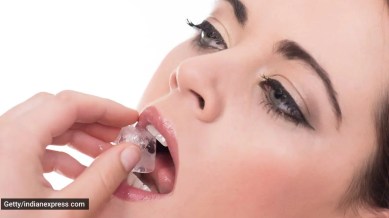📣 For more lifestyle news, click here to join our WhatsApp Channel and also follow us on Instagram
If you feel the urge to chew on ice, read this now
This desire is also called pica

It is normal to crave something sweet or savoury, but if you often crave ice — this article is for you. “Many people have chewed on ice at least once in their lifetime. But persistently craving for ice can indicate various underlying health issues,” said Dr Pratik Tibdewal, consultant gastroenterologist, Wockhardt Hospitals Mira Road.
Called pagophagia, chewing on ice is a “condition where an individual constantly craves to eat ice or chew on substances that have zero or no nutritional value. This desire is also called pica,” Dr Tibdewal told indianexpress.com, adding that such a feeling could indicate iron deficiency or anemia.
monthly limit of free stories.
with an Express account.
“Iron deficiency is a condition where one’s body is unable to produce an adequate amount of hemoglobin, a type of protein present in red blood cells (RBC) responsible for carrying oxygen from the lungs to the rest of the body. For people with iron deficiency anemia, chewing on ice can be satisfactory and help improve cognitive functions like memory, alertness, learning, decision-making, and the ability to multitask,” explained Dr Tibdewal.
However, chewing on ice can lead to dental issues such as chipped or cracked teeth, damage to tooth enamel, and increased sensitivity. Teeth are not designed to handle the hardness of ice, and repeated stress can cause significant damage, said Dr P Venkata Krishnan, senior consultant, internal medicine, Artemis Hospitals.
But, it is important to note that not every craving for ice indicates a nutritional or iron deficiency. “It can also be due to persistent habits because one might find the texture and coldness of ice fun and interesting. But it is crucial to note that this habit can hamper oral health and damage your teeth,” said Dr Tibdewal.
What can help?
Consult with a medical professional to rule out iron deficiency anemia or other health conditions. “If diagnosed, addressing the deficiency through diet or supplements may reduce the compulsion to chew ice,” said Dr Venkata.
Replace ice with healthier alternatives that provide a similar sensation, such as cold, crunchy vegetables (e.g., carrots or celery) or sugar-free gum. This can help in satisfying the urge without causing harm to your teeth. “Breaking the habit may require conscious effort and substitution strategies, like chewing sugar-free gum or eating crunchy vegetables,” mentioned Dr Venkata.
Employ behavioural strategies to break the habit, such as keeping track of when and why you chew ice. Identifying triggers can help you manage and curb the behaviour, mentioned Dr Venkata.
Consult experts to discuss these unique habits of yours for expert guidance and effective solutions to overcome it, urged Dr Tibdewal.
📣 For more lifestyle news, click here to join our WhatsApp Channel and also follow us on Instagram